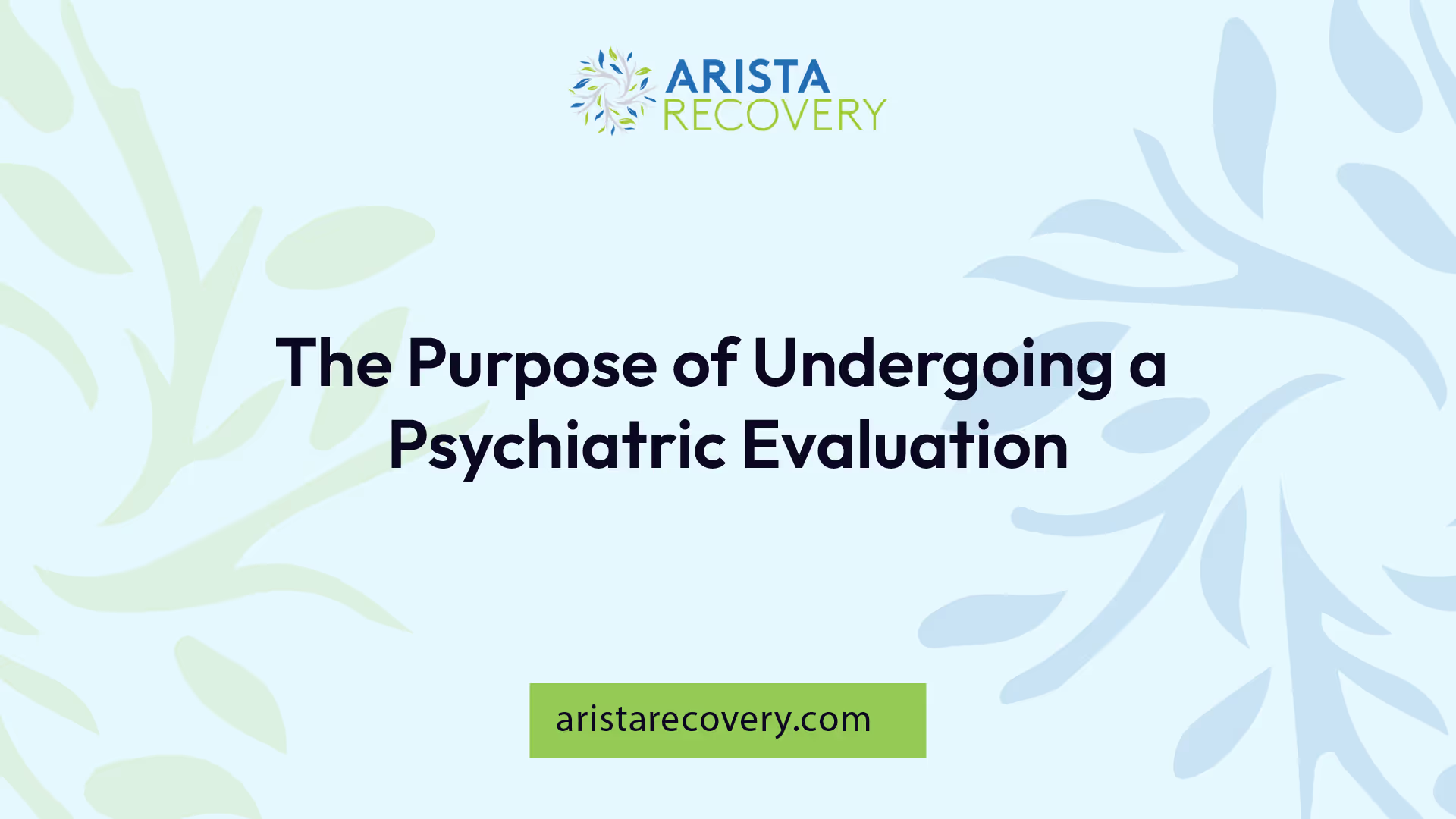The Purpose of Undergoing a Psychiatric Evaluation

Understanding Psychiatric Evaluation
Importance of Psychiatric Evaluation
Undergoing a psychiatric evaluation is crucial for assessing an individual's mental health. This clinical assessment is designed to evaluate a person's mental state and behavior, providing valuable insights for effective diagnosis and treatment planning. According to the MHM Group, it involves a series of questions focused on symptoms, thoughts, feelings, and behaviors. This process not only helps in identifying specific mental health issues but also in formulating the best course of action for treatment.
The evaluation plays a vital role in diagnosing emotional, behavioral, or developmental disorders. It takes into account various factors such as genetics, environment, and social influences that contribute to an individual's condition. A thorough evaluation can also help track the progress of treatment, adjusting approaches as necessary to improve outcomes.

Components of Evaluation
A comprehensive psychiatric evaluation typically includes several key components aimed at gaining a holistic understanding of the individual's mental health. These components may encompass:
ComponentDescriptionPsychiatric InterviewA detailed discussion about the individual's symptoms, history, and concerns.Medical HistoryReview of past medical and psychiatric issues, including family history.Symptoms AnalysisExamination of current symptoms and their impact on daily life.Behavioral ObservationsAssessment of behaviors and interactions during the evaluation.Educational and Psychological AssessmentsTests or tools to gauge cognitive and emotional functioning.Impact on Daily LifeUnderstanding how symptoms affect work, school, and relationships.
A thorough evaluation typically lasts about 60 minutes, focusing primarily on medication management and gathering background information [2]. Psychiatrists may incorporate additional findings to form a more comprehensive diagnostic picture, especially in therapeutic settings.
By covering these components, a psychiatric evaluation enables the medical professional to form an accurate diagnosis and recommend appropriate treatment strategies tailored to the individual's unique needs. This detailed understanding is essential for anyone considering undergoing a psychiatric evaluation to effectively address their mental health concerns.
Process of Psychiatric Evaluation
Understanding the process of a psychiatric evaluation is essential for those undergoing this assessment. It typically includes several key components: clinical assessments, diagnostic criteria, and treatment planning.
Clinical Assessments
A psychiatric evaluation begins with clinical assessments, which involve a thorough review of the individual's mental state. This initial assessment may include the following elements:
Assessment ComponentDescriptionBehavioral DescriptionsObservations of specific behaviors and symptoms presented by the individualImpact on Daily LifeExamination of how symptoms affect work, school, relationships, and activitiesPersonal and Family HistoryGathering information about the individual's background and any family history of mental health issuesMedical HistoryReview of past medical issues and any treatments receivedPsychiatric InterviewA comprehensive interview that covers symptoms, thoughts, and feelings
This comprehensive approach helps to gather critical information about the individual's mental and emotional state. Various medical professionals, such as psychiatrists and psychologists, may perform these evaluations [3].
Diagnostic Criteria
Once the clinical assessments are complete, diagnostic criteria are used to determine if a mental health condition exists. These criteria are typically outlined in established manuals, such as the DSM-5 (Diagnostic and Statistical Manual of Mental Disorders). The diagnostic process may involve:
Applying these criteria is essential for making an accurate diagnosis and paving the way for effective treatment options [3].
Treatment Planning
After establishing a diagnosis, the next step is treatment planning. This process involves creating a tailored plan that addresses the individual's specific mental health needs. Key components of treatment planning include:
Treatment ComponentDescriptionShort-term GoalsSetting achievable goals to provide immediate supportLong-term GoalsDeveloping a roadmap for sustained mental wellnessFamily InvolvementEngaging family members in the treatment process to provide supportCollaboration with ProfessionalsWorking closely with mental health providers to determine appropriate therapy and medication options
Active participation in creating treatment goals is vital for individuals with mental health disorders. This collaboration fosters a supportive environment conducive to recovery and lasting healing.
Through these steps—clinical assessments, diagnostic criteria, and treatment planning—an individual can better understand their mental health journey and receive the support they need to thrive.
Who Conducts Psychiatric Evaluation
The process of undergoing a psychiatric evaluation is a critical step in understanding an individual's mental health. Various professionals are trained to conduct these evaluations, each bringing unique expertise to the process.
Psychiatrists vs. Psychologists
Psychiatrists and psychologists both play essential roles in conducting psychiatric evaluations but differ in their training and approaches.
ProfessionEducation & TrainingFocusTreatment AuthorityPsychiatristsMedical doctors (M.D. or D.O.) with specialized training in psychiatryDiagnosis and treatment of mental health disorders, often using medicationCan prescribe medicationPsychologistsHold a doctorate (Ph.D. or Psy.D.) in psychology; extensive training in psychological testing and therapyAssessment, diagnosis, and therapeutic interventions for mental health issuesCannot prescribe medication (in most states)
Psychiatrists focus more on the biological and medical aspects of mental health. They are equipped to prescribe medication and provide treatment plans involving drugs. Psychologists, on the other hand, concentrate on behavioral and therapeutic approaches, often utilizing assessment tools to understand a patient's mental state better.
Psychological evaluations often include comprehensive background assessments, personality testing, and cognitive assessments [5].
Medical Professionals' Role
Beyond psychiatrists and psychologists, other medical professionals can also conduct psychiatric evaluations. These may include:
During a psychiatric evaluation, professionals may ask questions about symptoms, medical history, and family background to gather information about the patient's mental and emotional state [3]. A comprehensive approach is often taken, considering physical, genetic, social, emotional, and educational factors impacting the individual's mental health.
Settings for Psychiatric Evaluation
Psychiatric evaluations can occur in various environments, each offering unique benefits and characteristics. The primary settings for these evaluations include hospitals, clinics, and private practices.
Hospitals vs. Clinics
Hospitals are often equipped to handle more complex cases, especially those involving severe mental health issues or emergencies. Evaluations conducted in a hospital typically involve a comprehensive assessment, including medical history, symptoms, and potential medication management. The duration of these evaluations can range from 15 minutes to one hour, depending on the evaluation's complexity and urgency.
SettingAdvantagesTypical DurationHospitals- Handle severe cases, emergencies
- Access to full medical resources15-60 minutesClinics- Focus on routine outpatient care
- Often have a more relaxed atmosphere30-60 minutes
Clinics provide a less formal setting and are more suitable for those seeking ongoing care or routine evaluations. They can offer a variety of mental health services, including therapy and medication management, and are usually more accessible for regular visits.
Private Practices
Private practices feature a personalized approach to psychiatric evaluations. These settings allow for longer appointment times, typically lasting about 60 minutes. In private practices, professionals gather extensive background information and formulate therapeutic plans based on their clients' unique needs [5].
FeaturesDescriptionDurationApproximately 60 minutesFocus- Medication management
- Gathering background information
- Initial diagnostic formulation
Psychiatrists in private practice tend to be more involved in the therapeutic process, often integrating information from multiple sessions to create a comprehensive diagnostic picture. This setting can provide a comfortable environment conducive to open discussion, particularly for those who prefer a more individualized experience.
Each setting offers distinct advantages depending on the individual's specific needs during the process of undergoing a psychiatric evaluation. Whether in a hospital, clinic, or private practice, the important consideration is finding an environment that supports a thorough and effective evaluation process.
Duration and Preparation
Understanding the timeline and necessary preparations for undergoing a psychiatric evaluation is essential for anyone seeking insight into their mental health or treatment options.
Length of Evaluation
The duration of a psychiatric evaluation varies based on several factors, including the individual's age, medical history, and the reason for seeking treatment. Typically, a psychiatric evaluation lasts about 60 minutes, providing enough time to gather comprehensive background information and form an initial diagnostic impression for medication management. Factors that may extend the duration include detailed behavioral assessments, personal interviews, and the complexity of the individual's symptoms [3].
Evaluation TypeTypical DurationStandard Evaluation60 minutesTeen Psychological Evaluation30 to 90 minutes (varies)Comprehensive AssessmentSeveral hours (including tests and interviews)
For more intensive evaluations or those requiring multiple assessments, conversations may extend to a few hours. The nature of the treatment center and the specific tests administered can influence this length.
Preparing for Evaluation
Preparation for a psychiatric evaluation can significantly impact the effectiveness of the session. Individuals are encouraged to think about their mental health concerns and may find it helpful to jot down specific symptoms or experiences they wish to discuss. Important preparatory steps include:
The evaluation process typically involves discussions about behaviors, symptoms, their impact on work or relationships, a psychiatric interview, and a review of personal and family history, which may also include lab tests when necessary. Being well-prepared can lead to a more beneficial dialogue during the evaluation, ultimately helping both the evaluator and the individual achieve a clearer understanding of the concerns at hand.
Variations in Psychiatric Evaluation
Psychiatric evaluations can vary significantly based on the circumstances surrounding the individual. This section highlights two primary types: emergency evaluations and general evaluations.
Emergency Evaluations
Emergency psychiatric evaluations are crucial in situations where an individual is experiencing an acute mental health crisis. These evaluations are conducted by psychiatrists and aim to determine if the person requires immediate treatment [3].
The focus of an emergency evaluation is to:
Individuals who undergo emergency evaluations often display signs of severe psychiatric disorders or suicidal thoughts, making these assessments critical for timely intervention [3]. A table summarizing the key aspects of emergency evaluations is shown below.
AspectDescriptionPurposeImmediate assessment of risk and treatment needsConducted byPsychiatristsOutcomesHospitalization or outpatient treatment decisionFocusSafety, stabilization, and immediate intervention
General Evaluations
General psychiatric evaluations are comprehensive examinations aimed at assessing mental health conditions and determining necessary treatments. These assessments may include clinical consultations to screen for severe mental illnesses and evaluate further treatment options [3].
Key features of general evaluations include:
These evaluations are essential for individuals seeking to understand their mental health status and receive appropriate care. The following table outlines the main characteristics of general psychiatric evaluations.
AspectDescriptionPurposeThorough assessment of mental health conditionsConducted byPsychiatrists, psychologists, or mental health professionalsOutcomesComprehensive treatment plan based on evaluationFocusEmotional, behavioral, and developmental disorders
By recognizing the differences between emergency and general psychiatric evaluations, individuals can better understand what to expect when undergoing a psychiatric evaluation.
References
[2]:
[3]:
[4]:
[5]:
[6]:
You’re not alone in this.
When mental health challenges and addiction intersect, it can feel isolating. At Arista, we offer compassionate, evidence-based, and trauma-informed care to help you heal, grow, and move forward.
You’re not alone in this.
When mental health challenges and addiction intersect, it can feel isolating. At Arista, we offer compassionate, evidence-based, and trauma-informed care to help you heal, grow, and move forward.
Support that moves with you.
You’ve taken a brave first step. At Arista Recovery, we’re here to help you continue with best-in-class care designed for long-term healing and support.
.webp)






